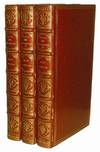
The Defence of Trade.: In a Letter to Sir Thomas Smith Knight, Gouernour of the East-India Companie, &c. From one of that Societie.
by DIGGES, Sir Dudley
- Used
- first
- Condition
- See description
- Seller
-
London, United Kingdom
Payment Methods Accepted
About This Item
London: William Stansby for Iohn Barnes,, 1615. some Ape hath put the Cats foot in the fire" - Digges's bulwark for the East India Company Rare first edition of Digges's important book, an early defence of the East India Company monopoly, and a counter-blast to The Trades Increase, an anonymous work of the same year usually attributed to the mysterious mercantilist Robert Kayll; records show that the last copy to appear at public auction was in 1955 (the Andre de Coppet sale, Sotheby's, 9 May). Sir Dudley Digges (1682/3-1639), politician and diplomat, from a well-connected Kent family, was "much preoccupied with overseas trade, he was a shareholder in the Virginia Company and the East India Company. He also took a keen interest in the search for the much vaunted north-west passage. One of the founders of a company incorporated in 1612 for the purpose of trading by that route, he published an account of the ensuing exploration. In 1613 Digges was appointed to the high commission, a prerogative court with jurisdiction in church matters, and his appointment was renewed periodically thereafter. The following year he was candidate for the governorship of the East India Company. Also in 1614 he sat at Westminster for Tewkesbury again, taking an active role as a committee member and speaking out against papists and the impositions which he believed were responsible for putting English merchants out of business" (ODNB). Digges was replying in large part to the ironically titled The Trades Increase; ironic, as The Trades Increase was also the name of the greatest English merchant vessel of the age, the pride of the EIC fleet, destroyed by fire off Bantam (now Banten), Java, in 1614; and which is mentioned by Digges at p. 20 ("New built, and ouerswaid as she was careening at Bantam"). Its purported author, Richard Kayll - referred to by Digges as an "vknowne busie Person" - was extremely critical of the EIC's trading activities, deploring its special right to export bullion, "railing against the trading restrictions, the company's near-criminal waste of sailors' lives, ships and investors capital, and accusing the EIC of diminishing, rather than improving, England's naval strength overall" (The History of Economic Thought website). He also remarked on the neglected English herring industry, into which trade the Dutch were making inroads. Kayll's criticism stung and the EIC board were keen to have him tracked down and tried but Digges took it on himself to refute Kayll's charges, which he proceeds to do in forensic fashion. Richmond Barbour, in his recent study of the loss of The Trades Increase, describes Digges as "a learned spokesman for the early modern nationalist elite"; and he certainly mounts his defence with a very persuasive colour and characterfulness. Speaking of the EIC, he says, "this honourable enterprise, like Hercules yet in the Cradle, in the infancie hath been assailed by Serpents slie aspersions, which Envie long since whispered in the eares of ignorance, of killing Mariners and carrying out the treasure of the land". He also gives a list of ships and their tonnage currently in the EIC's employ and figures for the imports of pepper, cloves, nutmeg, and mace. The Defence of Trade is addressed to the merchant Sir Thomas Smith or Smythe, chief promoter of the Company's successful first voyage. "In the hope of diminishing the length and hazards of East India Company expeditions, Smythe, who was also governor of the North-West Passage Company (1612), promoted voyages for the discovery of a north-west passage, especially those of Hudson (1610) and Baffin (1615), who gave his name to Smith Sound, between Greenland and Ellesmere Island" (ibid.). Digges Islands and Digges Sound in Hudson Bay were named for Sir Dudley. Small quarto (175 x 129 mm). Recent panelled calf to style. A very good copy, with the preliminary blank leaf. Richmond Barbour, The Loss of the "Trades Increase": An Early Modern Maritime Catastrophe, Philadelphia, University of Pennsylvania Press, 2021; Kress 341; STC 6845.
Reviews
(Log in or Create an Account first!)
Details
- Bookseller
- Peter Harrington
(GB)
- Bookseller's Inventory #
- 151920
- Title
- The Defence of Trade.
- Author
- DIGGES, Sir Dudley
- Book Condition
- Used
- Place of Publication
- London: William Stansby for Iohn Barnes,
- Date Published
- 1615
Terms of Sale
Peter Harrington
All major credit cards are accepted. Both UK pounds and US dollars (exchange rate to be agreed) accepted. Books may be returned within 14 days of receipt for any reason, please notify first of returned goods.
About the Seller
Peter Harrington
Biblio member since 2006
London
About Peter Harrington
Since its establishment, Peter Harrington has specialised in sourcing, selling and buying the finest quality original first editions, signed, rare and antiquarian books, fine bindings and library sets. Peter Harrington first began selling rare books from the Chelsea Antiques Market on London's King's Road. For the past twenty years the business has been run by Pom Harrington, Peter's son.
Glossary
Some terminology that may be used in this description includes:
- Quarto
- The term quarto is used to describe a page or book size. A printed sheet is made with four pages of text on each side, and the...
- Calf
- Calf or calf hide is a common form of leather binding. Calf binding is naturally a light brown but there are ways to treat the...
- First Edition
- In book collecting, the first edition is the earliest published form of a book. A book may have more than one first edition in...




